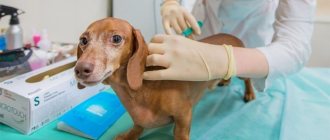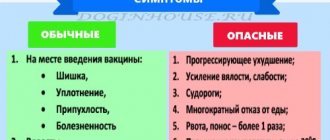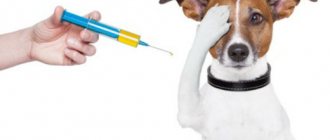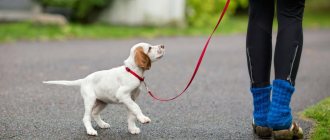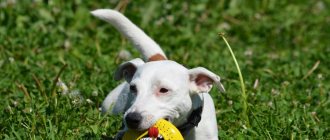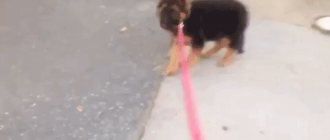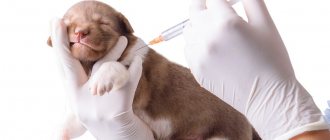Vaccination for dogs is mandatory. It protects pets from serious diseases or alleviates their course. To make the procedure easy and without consequences, you need to know the basic recommendations. Including how to prepare your pet, whether it is possible to walk after vaccination, bathe it, what to do if the animal does not eat and itches.
Indications for vaccine administration
There is no cure for rabies. The disease is provoked by a neurotropic virus, which, once in the nervous system, quickly affects brain cells.
Dogs are most often susceptible to this disease. Not only strays, but also pets are at risk.
While walking, your four-legged friend may be bitten by another dog carrying the virus. The infection is also transmitted through contact with cats.
Pets that are taken hunting can get the virus from wolves, foxes, and wild birds.
The danger of rabies is that the incubation period lasts at least 40 days without obvious signs of infection. When clinical changes begin, it is no longer possible to correct anything.
During this period, the sick animal spreads the infection to its immediate environment, first through saliva, then begins to bite. If there are other pets in the house (cats, birds, hamsters, etc.), they become potential victims of infection.
Already in the first days after infection, the animal is able to “share” the virus with its owners by licking their hands or face. The slightest crack or abrasion on the body is enough to get rabies.
Importance of grafting
The vaccine allows you to protect your pet by making it resistant to the virus. Even if a dog is bitten by a sick animal, the immunity that appears after the vaccination kicks in.
By protecting a pet in this way, the owner protects his family and surrounding people from serious danger.
Vaccination against rabies in dogs is not only regulated by law. A person bears some responsibility for failure to comply. When deviating from vaccination, owners face the following problems:
unvaccinated animals cannot be walked in crowded places and transported on public transport;- they should not be taken hunting, fishing, dacha, nature - the risk of infection is too great;
- Without a vaccination mark, a dog will not be allowed to participate in exhibitions and will not be allowed to travel abroad with it.
If a pet bites someone, the owner must present the dog's passport, which must contain a vaccination stamp. Otherwise, the animal is isolated for 10 days to monitor its behavior, and the owner is fined.
Vaccination procedure
Vaccinations for dogs begin 2 months after birth. During this period, a vaccine against major diseases is used. In the second round, at 12 weeks, the puppy is also vaccinated against rabies. Then revaccinations are carried out every year to strengthen the immune system.
The animal is prepared for the procedure: internal parasites and fleas are removed. Since the vaccine contains live strains, the pet must be completely healthy at the time of vaccination, otherwise the body will not be able to fight the virus.
Deworming of an animal
Treatment against parasites begins 10 days before vaccination. To eliminate worms, you can use Drontal, Kanikvantel plus, Milbemax. The products are used strictly according to the attached instructions.
If after the course the parasites have not disappeared, repeated cleaning is required. It is advisable to choose a different drug to avoid addiction.
Introduction of a complex vaccine
Any vaccination is stressful for the animal. To reduce the risk of injury to your dog, it is recommended to use polyvalent vaccines. They allow an animal to develop immunity from several diseases in one procedure.
It is recommended to use such drugs if you are planning to travel abroad with your dog.
The European Travel Union is guided by a list that limits the list of acceptable vaccines. In this case, the best option is the polyvalent drugs Duramun, Nobivak, Eurikan.
Administration of anti-rabies drug
The veterinarian can also give an injection with a monovalent drug, following the vaccination schedule. If several consecutive vaccinations are meant, then the doctor uses the same drug at each session.
A standard graph looks like this:
at 3 months;- at 1 year or 15 months;
- annually.
Unscheduled vaccinations are also carried out if a rabies quarantine has been declared in the area where the dog lives. Pets are also vaccinated if they are attacked by other animals.
Necessary restrictions
The quarantine period is individual and depends on the age, breed, health status and territory in which the dog lives. On average it is 14 - 21 days. During this period, the immune system is greatly weakened, so the following precautions are taken:
- After vaccination, you need to stay in the veterinary clinic for at least 20 minutes . During this time, side effects associated with individual intolerance to the components of the drug will appear.
- Closed clean room.
- Lack of contact with other animals . A healthy pet can carry the virus on its fur or whiskers.
- Do not allow your pet near bags, outdoor shoes and clothes.
- Avoid water procedures and hypothermia.
- Reduce physical activity.
- Walking on the street is strictly contraindicated.
Is quarantine necessary after vaccination?
The administered drug does not provide immediate protection.
Expert opinion
Panteleeva Irina Petrovna
Breeder, 11 years experience.
In order for the immune system to begin to resist foreign organisms, it takes time to produce antibodies. This takes from 8 days to 2 weeks, during which the animal feels unwell and becomes vulnerable to any infection.
Purpose of quarantine
It is necessary to exclude contact between your pet and stray dogs, other animals and strangers.
The following activities are carried out:
- Limiting the physical and mental stress of a weakened pet.
- Close monitoring of the dog’s health in order to timely identify negative reactions to the vaccine.
- Creating optimal conditions for the period of strengthening immunity: protection from overheating, hypothermia, stress and other negative factors.
The question of whether a dog needs quarantine after vaccination should not even arise. This is especially true for puppies being vaccinated for the first time.
What to do if pulmonary fibrosis is detected?
Fibrosis is a pathological proliferation of connective tissue, which leads to a decrease in the size of the alveolar vesicles, that is, the air space. With pneumonia, adhesions of connective tissue form around foci of inflammation. As a result, the porous tissue of the respiratory organ becomes denser, the structure of the lung matrix is disrupted, and the space available for air and gas exchange is reduced.
Pulmonary fibrosis resembles scars and requires self-treatment. The consequences of such a complication of pneumonia may be irreversible.
Thus, fibrosis represents an aggressive but physiologically justified response to inflammation or mechanical injury. The body creates an artificial barrier between affected and healthy tissues. Pulmonary fibrosis as an outcome of viral pneumonia caused by COVID-19 is observed in approximately 15% of cases.
As a rule, small local fibrosis in one of the segments of the lung, unlike multiple diffuse fibrosis, does not affect the patient’s quality of life. However, the complication requires separate treatment, which, if necessary, will be prescribed by a pulmonologist after studying the results of CT scans and functional tests.
Manifestations of fibrosis may include shortness of breath, a feeling of lack of air, and intolerance to physical activity. The goal of a rehabilitation course for pulmonary fibrosis is to restore the previous lung volume. The patient is recommended conservative treatment, including drug therapy, breathing exercises, and lifestyle correction.
It is possible to finally assess the severity of fibrotic changes after coronavirus, as well as their significance, only after 12 months. Therefore, it is recommended to repeat a CT scan of the lungs for fibrosis every year.
Consequences of failure to comply with dog isolation periods
If you ignore the veterinarian's recommendations regarding the rehabilitation period after vaccination, any irreversible consequences are possible.
How are quarantine periods set?
The deadlines are determined individually in each specific case, taking into account the following factors:
Puppies have a more weakened immune system compared to adults. therefore, a long period of rehabilitation is prescribed for children;- the survival rate of the strain introduced for the first time takes longer, and after each revaccination the quarantine period is shortened;
- It is important to pay attention to the type of vaccine: when using polyvalent strains, the body needs more time to produce antibodies.
In the latter case, the immunization process takes at least 3 weeks. For weakened dogs and puppies, quarantine after polyvaccination should last about 30 days.
Dog at risk
While the body has directed all its efforts to produce antibodies, the animal becomes open to any infection.
If you do not keep your pet at home, the risk of contracting rabies increases many times over, and vaccination will not help save your pet from death.
Other consequences
If quarantine is not observed, dog owners also experience inconvenience.
If the owner violates the conditions of rehabilitation, he will not only not be able to take the pet with him abroad, but will also not be allowed on planes and trains to travel around the country. The dog will not be able to take part in any exhibition.
Caring for the animal after vaccination
During quarantine, the dog’s usual rhythm of life changes. They not only try not to walk her, but also limit her contact with other pets in order to eliminate the risk of the slightest infection.
The veterinarian gives recommendations on a balanced diet to support a weakened body.
There is also a limitation on the number of water procedures. If the dog is an adult, then 7-10 days after vaccination it can be bathed. But the puppy will have to endure until the end of quarantine. But if the need arises, then adhere to the following rules:
use only warm water and shampoo that does not cause allergies;- when swimming and for some time after it, all windows and doors in the house should be closed to avoid drafts;
- you need to use 2 towels - one to dry the fur well, and the other to wrap the pet until completely dry.
A vaccinated dog should be protected from hypothermia. It is also important to monitor the emotional state - you should not expose the animal to stress.
Is it possible, how and for how long to walk with a puppy without vaccinations?
Every breeder will say categorically no. Is it possible to walk a puppy without vaccinations, relying on maternal immunity? No, it is active up to 8 weeks. This is a very young age for walking.
Within the city limits
This is especially dangerous, since in densely populated areas there are a lot of domestic and stray animals, vaccinated and not. The risk is great.
In the country
We have to be careful. In rural areas, most domestic dogs have never been vaccinated, or the procedure was carried out once. It’s safer to get vaccinated and quarantine and walk around calmly with good immunity.
Is contact with other puppies allowed?
With strangers prohibited. Contact is allowed with puppies of the same litter and they should be vaccinated at the same time!
Side effects after vaccination: what can happen to a dog
Quarantine after vaccination is also necessary in order to provide the pet with the necessary help in a timely manner if something goes wrong after the procedure. Animals, like people, react differently to drugs.
Standard options
No vaccination takes place without complications. If a swelling (or even a lump) forms at the injection site, redness is noticeable, and a high temperature rises, the symptoms can be considered a physiological norm . But only if the signs are observed for a week, no more.
Other complications that should not cause the owner to panic include:
- lethargy of the animal within 24 hours after vaccination;
- minor vomiting and problems with stool;
- short-term lack of appetite.
All these are normal consequences of immunization and are not pathologies. But if symptoms last more than 10 days after vaccination, you should contact your veterinarian.
Deviations worth paying attention to
If vaccination was not carried out according to the rules, without observing hygiene standards, more serious complications may arise:
frequent intense vomiting;- persistent temperature above +39 °C;
- refusal to eat and severe weakness for more than 24 hours;
- muscle twitching, cramps;
- severe pain at the injection site.
The dog may limp or drag its hind legs - this is also abnormal.
Any of the complications develops against the background of a hidden illness that was not noticed during preparation for the procedure. Negative consequences are often caused by a low-quality vaccine.
What to do if you have allergies
An inadequate reaction sometimes manifests itself in the form of shortness of breath or hypoxia, serous discharge from the sinuses and eyes, salivation, and even anaphylactic shock.
The pet must be taken to the doctor immediately, having first provided medical care at home. The following are recommended as antihistamines: Tavegil, Suprastin, Diphenhydramine.
Is repeat CT scanning of the lungs harmful?
Any study using ionizing x-ray radiation is a burden on the body. During the year, radiation exposure not exceeding 15-20 mSv is permissible. For health reasons - up to 50 mSv, according to the current Radiation Safety Standards of the Russian Federation (NRB-99). When treating a disease with a high mortality rate and complications, such as viral pneumonia caused by COVID-19, repeat computed tomography is more beneficial than harmful. Expedient radiation exposure is justified.
Duration of quarantine
Vaccination of animals against rabies is regulated by law. Not only the schedule for administering the vaccine has been established, but also the quarantine period after the procedure.
The veterinary legislation (section “Measures for the prevention of rabies”) specifies the uniform quarantine period for the Russian Federation - 1 month.
Instructions that come with vaccines may indicate shorter durations. These recommendations can be followed if the dog will not be taken anywhere or sold.
When can you take your dog out into the world? If the pet participates in exhibitions and other competitions, the vaccination stamp in the passport should not be expired.
An unvaccinated dog is vaccinated no later than a month before the event with a mandatory quarantine of 30 days.
Bathing products
There are many pet shampoos available in pet stores. It is necessary to bathe your pet only with a special pet shampoo for dogs. Human cannot be used.
The best pet shampoos:
- Keratolux Virbac.
- Tar.
- Mr Bruno.
- Doctor ZOO.
- Mild Puppy.
- Royal Groom.
- 8 in 1 Tea Tree Oil Shampoo.
- Beekeeper.
- Espree Bright White Shampoo.
- Pet Head Dry Clean.
Zoo shampoos not only wash away dirt from the fur, but also destroy ticks, fleas, lice and other skin parasites.
